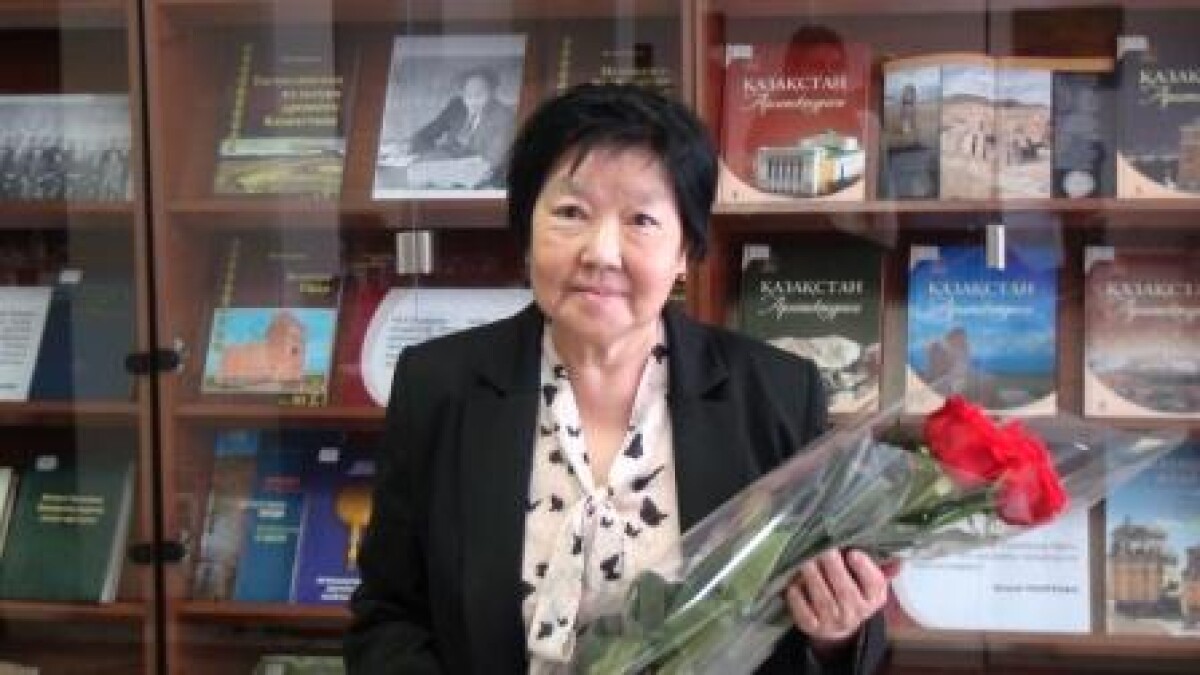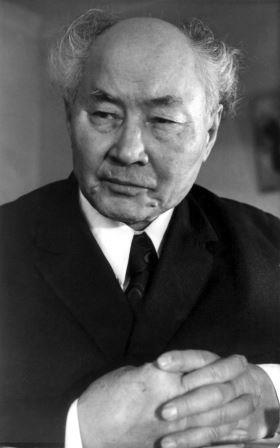
This year is the 110th anniversary of birth of the most famous Kazakhstan’s archaeologist, holder of encyclopedic knowledge in history, culture, ethnography and folklore of Kazakh people and discoverer of Begazy-Dandybay culture. It was Alkey Khakanovich that for the first time proved that on the territory of Central Kazakhstan ancestors of Kazakhs mined metal, which means that there was a culture and civilization but not bare deserted steppe as scientists confidently believed.

However, not everyone knows that on May 31, the Day of the Victims of Political Repression, we will remember the name of the prominent Kazakh scholar A.Kh. Margulan.
Daniel Alkeyevna, I have learnt that the fate of Kazakh intellectuals, I mean arrest and repressions, did not passed by your father, academician Margulan.
— Unfortunately, it was. But he did not like telling about it. Once he only told that while being postgraduate student of Institute of Material Culture of the Academy of Science of the USSR in St. Petersburg he was arrested. Postgraduate studies were interrupted, and only in 1937, if I am not mistaken, he was enrolled again and defended his candidate dissertation. I suppose that he was so run away with the history of Kazakhs that, seemingly, it attracted somebody’s attention and he was incriminated in nationalism.
How much time did Alkey Khakanovich spend in jail?
— He was at Petropavlovsk fortress for one year. Then there were more terrible things, he went through a full repression, but did not like to talk about it. Grandfather from my mother’s side was a brother of academician K. A. Satpayev. When my farther came back from St. Petersburg in 1939 a branch of the Academy of Sciences of the Kazakh SSR was functioning in Alma-Ata. Kanysh Amantayevich hired him to work for the Institute of History, as I understand, to protect my farther from future persecution, because he had a very gentle nature, he was amazingly kind person. It was Satpayev who advised him to go into archeology. He saw a lot of monuments in the steppes, where he worked, and, of course, wanted to entrust their study to the person who would bring it to the end.
Father excavated mounds, left for the field for 2–3 months. And before this he worked hard to prepare for excavation: long correspondence with the leaders of districts to obtain bulldozers for digging. Since the mound was shot to the ground, it was a great and laborious work.
When Alkey Khakanovich discovered Begazy-Dandybay culture, was it a scientific boom?
— The work on Begazy-Dandybay age was recognized as an achievement of Kazakhstan’s science. Before this great v. V. Bartold claimed that culture in Kazakhstan was confined by the Karatay Mountains next to Taraz. And there was no any life and culture after that. My farther proved how deeply wrong he was.
Father was deeply fascinated by the culture and traditions of the Kazakhs. For example, he studied the history of batyrs. He wrote in his writings that batyrs have high value in the Kazakh steppe, and every woman wanted to give birth to batyr. There was a belief that to do this woman should eat wolf ears. Father witnessed that in Shaprashty clan, famous family to which our President belongs, women hung wolf ears on besik to make their baby grow up and become batyr. His works are incredibly interesting to read, they captivate.
It is amazing, what a workaholic he was. Perhaps it was the reason of such results. He used to sit at the desk at night, up to 6–8 a.m. I remember that at night I several times go to him and say: «Go to bed» he answered me: «I will, Aynalayyn, I will go». Two or three hours later come back- the lights on and he continue working. He had a very interesting methodology of work. Of course, he was tired and arranged such a rest by going from one theme to another.
I also remember when my father wrote about Begazy-Dandybay culture of Central Kazakhstan (and at the same time he wrote a book on the architecture of Kazakhstan, on which he worked all his life), in the evenings, after dinner, being tired, he sat down on the sofa, took dombra, and was strumming and humming. At these moments, we had the impression that in this way he literally immersed in that era, which he wrote about, lived in that cities, among those people. So deeply he «was inside the subject» as the philosophers say.
I cannot avoid the question: what kind of father he was?
— I am often asked how he nurtured me. He did this by his own example, lifestyle and attitude to labor. To read reprimand or to make observations loudly — this never happened. I remember such situations. I studied in graduate school in Moscow and lived in an academic hostel. Once in winter I look and see my father coming up the stairs. I was so surprised and I asked him: «Dad, what are you doing?». And he answered: «Honey, I want to see where you live». He was very careful.
Tell me, please, about the work on biography of academician A. Kh. Margulan
— Last year we applied for the grant to work on «The Role of Intellectual Heritage of Academician Margulan in a New Concept of Historical Science». This year is marked by great events: proclamation that the history must be true, and the second is the announcement of the national idea «Mangilik yel». One of our goals is to write a scientific biography of Margulan. He was, as some like to say, Encyclopaedist, and we need to write a scholarly biography that is scientific analysis of the works.
What work on academician archive is carried out nowadays?
— Fathers’ archive and library were huge. The major part of book I presented to Otrar library. Five years ago enormous archive about Shokan Valikhanov was transferred by me to Pavlodar University, research fellows of which conducted detailed analysis, processed everything to the last page and published two-volume edition of «Margulan’s Archive». Later the materials were transferred to the National Archive of the RK in Astana and to the Central State Archive in Almaty. However, I am not ready to give away the main part of the archive, father’s manuscripts and photos of monuments are at home. Archive is so large that it is hard to imagine that everything was done by one person.
Is there a Center for studying A. Kh. Margalan’s heritage?
— There is a public fund named afteracademician Margulan. From time to time we publish something. And today we are faced such a problem; we want to publish four volumes of selected works of Alkey Khakanovich.
What events are expected to be a part of the celebration of the 110th anniversary of academician Margulan’s birth?
— On July 19 there will be a great celebration of the 110th anniversary of scientist’s birth in aul named after A. Kh. Margulan. The second event, about which I know, is scientific conference that will take place in October in Pavlodar
Ludmila VYKHODCHENKO
translated by I. KUZMENKO
June 2, 2014


